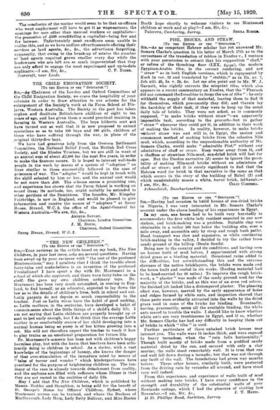PISE, BRICKS, AND STRAW.
[To THE EDITOR OF ' THE " SPECTATOR.")
Sia,--As no competent Hebrew scholar has yet answered Mr. Somers Clarke's question in his letter of March litk as to the correctness of the translation of telrhen in Exodus v., I venture with your permission to submit that his supposition "chaff," or refuse of the threshing floor (IX, deem), the modern Egyptian-Arabic tibn, is the correct rendering, and not
"
straw" as in both English versions, which is represented by' Kash in ver. 12 and translated by "stubble," as in Ex. xv. 7, Job 'Hi. 25, Is. v. 24, &c. Let me 'also point out to Mr. W. J. Garnett, who rightly corrects the misprint tibu, which also appears in a recent commentary-on Exodus, that the "Pharaoh I did not command the Israelites to forgo the use of tibn" : he only ' withheld the supply of that material, leaving them to find it for themselves, which presumably they did; and therein lay the hardship of their task, if they were to keep up the usual daily tale of bricks. They were not asked, as is commonly supposed, "to make bricks without straw "—an apparently impossible task, according to the proverb—but to gather " straw " wherever they could get it, in addition to their work of making the bricks. In reality, however, to make bricks without straw was and still is, in Egypt, the easiest and commonest method of making bricks- from the cohesive Nile mud, which, according to the unquestionable authority of Mr. 'Somers Clarke, would make "admirable Piste" without any admixture of chaff or straw. Keep water away from it, and a &Eases or strawless Nile-mud, sun-dried brick will last for ages. But the Exodus narrative (d) seems to ignore the possi- bility of making Nile-mud bricks without an admixture of chaff or straw; and it is surely significant to find that the Hebrew word for brick in that narrative is the same as that which occurs in the story of the building of Babel (J) and which unmistakably means a white, burnt brick, lebhenah.—










































 Previous page
Previous page